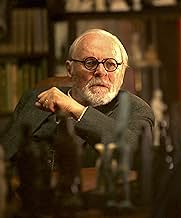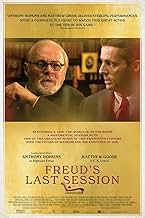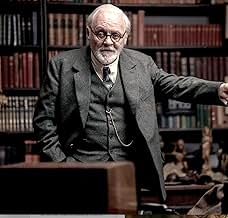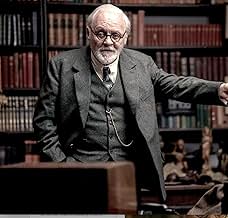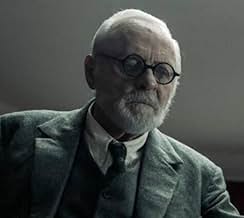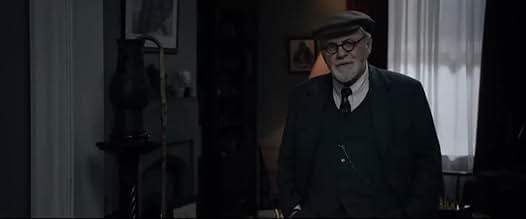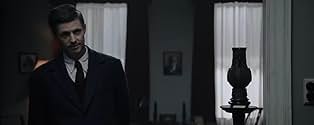Freud invita l'iconico autore Clive Staples Lewis a discutere dell'esistenza di Dio.Freud invita l'iconico autore Clive Staples Lewis a discutere dell'esistenza di Dio.Freud invita l'iconico autore Clive Staples Lewis a discutere dell'esistenza di Dio.
- Regia
- Sceneggiatura
- Star
- Premi
- 1 candidatura in totale
George Andrew-Clarke
- Paddy Moore
- (as George Clarke)
Anna Amalie Blomeyer
- Ilsa
- (as Anna Blomeyer)
Recensioni in evidenza
"Freud's Last Session" comes as a huge disappointment for me. This fictionalized encounter between groundbreaking pyschoanalyst Sigmund Freud
(Anthony Hopkins) and writer C. S. Lewis (Matthew Goode), on the early days of World War II with the first German bombers coming to England, doesn't
challenge viewers in asking themselves about what they're trying to figure out while challenging themselves about the nature of man and if God exists
or not (Freud is an atheist; Lewis is a Christian believer).
Adapted from Matt Brown's play, the material is poorly translated to the screen which doesn't allow a solid 15 minutes with both of those characters alone in their session without coming back and forth between some background moments from each character, or either some present situations with the threats of bombing or Freud's poor health that needs constant care from his daughter, of which we have some tense revelations about her relationship with her dominating father. And they tried so hard to make it a plot twist when it comes about that character and her secretary that it was annoying - specially if you know that while Freud didn't condemn homosexuality as a moral issue, he didn't want them near him (read Paul Roazen's works on him).
One sort of expects this being a psychoanalysis session rather than a weird chatting between famous authors with opposite views. For the life of me, as it wasn't a session in fact, I still don't have a clue on what Lewis was doing there. The verbal duels are the moments we wait for, there are so many interesting bits and exchanges between them but as a whole it all falls flat because either the dialogue is not that brilliant; the editing makes it all look like a tennis match - there's not a single moment for some monologue or some plan sequence; and the constant sidetrack of past moments that tries to build some character, or show some background but it's all disengaging and tedious.
A film that works with such ideals and challenges about mankind, God, faith and human relations while opposed or favorable to all that must have some coherence between action and dialogues, to create something that we in the audience might have question ourselves or haven't thought about. It must create some excitment even if those issues aren't all that thrilling (to some) and stay in the "boring" play format without distractions. If there's a play and film adaptation that translated such sentiment in a brilliant way was "The Sunset Limited", with Samuel L. Jackson and Tommy Lee Jones. Simple through actions as it stays in a small apartment room and the brilliance from the complex dialogues becomes a fascinating and mindblowing experience. Hopkins and Goode don't share the same dynamic despite being good performers. The excessive use of humor and the many interruptions in their digressions didn't help, and we perceive them as bitter figures that don't reach any enlightning conclusion.
Here's a film that crushed any previous and possible good expectations that I could have about presenting a challenging duel of opposed views from great minds of the 20th century, starring two favorite actors of mine. Its flawed and distractive presentation left me emptied out and waiting for more. Sadly, it delivered so little that either Freud and Lewis still became mysteries to me, and only their works or books about them will solve a little such mystery. I'd rather see Freud's first session, instead. 5/10.
Adapted from Matt Brown's play, the material is poorly translated to the screen which doesn't allow a solid 15 minutes with both of those characters alone in their session without coming back and forth between some background moments from each character, or either some present situations with the threats of bombing or Freud's poor health that needs constant care from his daughter, of which we have some tense revelations about her relationship with her dominating father. And they tried so hard to make it a plot twist when it comes about that character and her secretary that it was annoying - specially if you know that while Freud didn't condemn homosexuality as a moral issue, he didn't want them near him (read Paul Roazen's works on him).
One sort of expects this being a psychoanalysis session rather than a weird chatting between famous authors with opposite views. For the life of me, as it wasn't a session in fact, I still don't have a clue on what Lewis was doing there. The verbal duels are the moments we wait for, there are so many interesting bits and exchanges between them but as a whole it all falls flat because either the dialogue is not that brilliant; the editing makes it all look like a tennis match - there's not a single moment for some monologue or some plan sequence; and the constant sidetrack of past moments that tries to build some character, or show some background but it's all disengaging and tedious.
A film that works with such ideals and challenges about mankind, God, faith and human relations while opposed or favorable to all that must have some coherence between action and dialogues, to create something that we in the audience might have question ourselves or haven't thought about. It must create some excitment even if those issues aren't all that thrilling (to some) and stay in the "boring" play format without distractions. If there's a play and film adaptation that translated such sentiment in a brilliant way was "The Sunset Limited", with Samuel L. Jackson and Tommy Lee Jones. Simple through actions as it stays in a small apartment room and the brilliance from the complex dialogues becomes a fascinating and mindblowing experience. Hopkins and Goode don't share the same dynamic despite being good performers. The excessive use of humor and the many interruptions in their digressions didn't help, and we perceive them as bitter figures that don't reach any enlightning conclusion.
Here's a film that crushed any previous and possible good expectations that I could have about presenting a challenging duel of opposed views from great minds of the 20th century, starring two favorite actors of mine. Its flawed and distractive presentation left me emptied out and waiting for more. Sadly, it delivered so little that either Freud and Lewis still became mysteries to me, and only their works or books about them will solve a little such mystery. I'd rather see Freud's first session, instead. 5/10.
I respect S Freud as an early but pioneering psychologist, and I very much admire C. S. Lewis as a humanist and fiction writer. Whether this meeting between Freud and Lewis really happened doesn't matter so much, I think. What matters is that it's a fascinating concept to imagine the two men debating science vs religion, and this film does a very decent job of portraying this discussion.
While I wouldn't go so far as to call this the most moving film I've ever seen - I think Shadowlands for example was far more moving and The Soul Keeper ( a film about Jung and his female patient ) was more intriguing - I did genuinely find Freud's Last Session to be philosophically poignant. The discussions between Freud and Lewis are intellectually sound and do ask those age old questions, such as if God is good, why is there suffering? A question I guess we all grapple with in one way or another.
This film did remind me a bit of In Lambeth the other play about a fictional meeting between Thomas Paine and William Blake which, while quite different, approached the two sides of a philosophical debate in a similarly genuine and interesting manner.
Ultimately, there is quite a good amount of wisdom and intellectual content in Freud's Last Session and for that I found it fun, mildly moving and worthwhile. The cinematography and acting are decent. If you like psychology, philosophy and films that are really just play's on screen, then I hope you'll enjoy this.
While I wouldn't go so far as to call this the most moving film I've ever seen - I think Shadowlands for example was far more moving and The Soul Keeper ( a film about Jung and his female patient ) was more intriguing - I did genuinely find Freud's Last Session to be philosophically poignant. The discussions between Freud and Lewis are intellectually sound and do ask those age old questions, such as if God is good, why is there suffering? A question I guess we all grapple with in one way or another.
This film did remind me a bit of In Lambeth the other play about a fictional meeting between Thomas Paine and William Blake which, while quite different, approached the two sides of a philosophical debate in a similarly genuine and interesting manner.
Ultimately, there is quite a good amount of wisdom and intellectual content in Freud's Last Session and for that I found it fun, mildly moving and worthwhile. The cinematography and acting are decent. If you like psychology, philosophy and films that are really just play's on screen, then I hope you'll enjoy this.
There is a recent outbreak of films made for people past puberty and this film is one of them. Serious issues are discussed. Thoughts are provoked. Both actors (and the actresses who get less flamboyant screen time) play intelligent philosophers grappling with something we all have to face - is there an eternity? Or oblivion? What prompts a genocide by humans to eliminate theirnown species? No flying cars or superheros, just intelligent adults grappling with serious questions.
Anthony Hopkins fills his unpleasant character with a minimum of scenery chewing, and Matthew Goode was a pleasant surprise, keeping his more quiet character in the mental battle. But the little known story of Anna Freud is tragic and brings real emotion to the story. A grown up film (sorry, Barbie).
Anthony Hopkins fills his unpleasant character with a minimum of scenery chewing, and Matthew Goode was a pleasant surprise, keeping his more quiet character in the mental battle. But the little known story of Anna Freud is tragic and brings real emotion to the story. A grown up film (sorry, Barbie).
As a fan of Lewis' work (though far from being an expert on the guy) I was very interested in seeing this film. Even though the target audience is probably 30 years my senior, I still enjoyed it quite a bit. Hopkins's and Goode's performances really carry the film. Normally, I struggle with movies that use a lot of flashbacks to tell the story but it was done here in such a way as was helpful and not distracting or disorienting.
I do wish the script had been a bit stronger. There were a couple scenes that seemed to fizzle out rather than having a much needed emphatic response, mostly on Lewis's end.
Overall I liked the film and would see it again.
I do wish the script had been a bit stronger. There were a couple scenes that seemed to fizzle out rather than having a much needed emphatic response, mostly on Lewis's end.
Overall I liked the film and would see it again.
It's 1939 on the very eve of declaration of War in London. Oxford don C. S. Lewis (Matthew Goode) calls upon Sigmund Freud (Anthony Hopkins) at his invitation. He passes Anna Freud (Liv Lisa Fries) as she goes out to lecture and ponder whether she will reveal her lesbian affair to her father. Meanwhile, the two men attack each other's philosophical beliefs.
And that's what the movie is, two men talking, interrupted occasionally by flashbacks to their younger days and air raid to lend this stage play some cinematic credibility. In this made-up scenario -- although the story is that an Oxford don visited Freud shortly before his death, the claim, as here, that it was Lewis, is a fabrication of the play and movie -- they argue around each other, and finally agree only that people are afraid of death.
The rest of it.... well, Freud's beliefs are at the end of his life (he died three weeks after the supposed events of this film), while there are plenty of things that Lewis did say until twenty years after. As for the basic disagreement about religion versus science, that's a non-conflict; as smarter people than I have declared, science is about how, not why. If G*d created the universe we live in, thanks a lot.
Both men are fine actors and easily translate the script into natural-sounding words. I have no idea if Hopkins' accent is a good representation of the Viennese one; Kohli Calhoun is listed as the dialect coach.
And that's what the movie is, two men talking, interrupted occasionally by flashbacks to their younger days and air raid to lend this stage play some cinematic credibility. In this made-up scenario -- although the story is that an Oxford don visited Freud shortly before his death, the claim, as here, that it was Lewis, is a fabrication of the play and movie -- they argue around each other, and finally agree only that people are afraid of death.
The rest of it.... well, Freud's beliefs are at the end of his life (he died three weeks after the supposed events of this film), while there are plenty of things that Lewis did say until twenty years after. As for the basic disagreement about religion versus science, that's a non-conflict; as smarter people than I have declared, science is about how, not why. If G*d created the universe we live in, thanks a lot.
Both men are fine actors and easily translate the script into natural-sounding words. I have no idea if Hopkins' accent is a good representation of the Viennese one; Kohli Calhoun is listed as the dialect coach.
Lo sapevi?
- QuizAnthony Hopkins had previously portrayed C.S. Lewis in Viaggio in Inghilterra (1993) 30 years prior to this film.
- BlooperLewis refers to JRR Tolkien as "John". He was known as "Ronald" to his friends.
- Citazioni
J.R.R. Tolkien: Jack, when you read myths about gods that come to Earth and sacrifice themselves, their stories move you, so long as you read it anywhere but the Bible.
- ConnessioniFeatured in The 7PM Project: Episodio datato 19 aprile 2024 (2024)
- Colonne sonoreVariations on an Original Theme, Op. 36, 'Enigma' Variation 9: Nimrod
Composed by Edward Elgar
Performed by Symfonický orchester Slovenského rozhlasu (as Slovak Radio Symphony Orchestra) & Adrian Leaper (Conductor)
Licensed courtesy of Naxos Music UK Ltd
I più visti
Accedi per valutare e creare un elenco di titoli salvati per ottenere consigli personalizzati
- How long is Freud's Last Session?Powered by Alexa
Dettagli
- Data di uscita
- Paesi di origine
- Lingue
- Celebre anche come
- La Última Sesión de Freud
- Luoghi delle riprese
- Aziende produttrici
- Vedi altri crediti dell’azienda su IMDbPro
Botteghino
- Lordo Stati Uniti e Canada
- 906.283 USD
- Fine settimana di apertura Stati Uniti e Canada
- 45.590 USD
- 24 dic 2023
- Lordo in tutto il mondo
- 4.190.596 USD
- Tempo di esecuzione
- 1h 50min(110 min)
- Colore
Contribuisci a questa pagina
Suggerisci una modifica o aggiungi i contenuti mancanti






